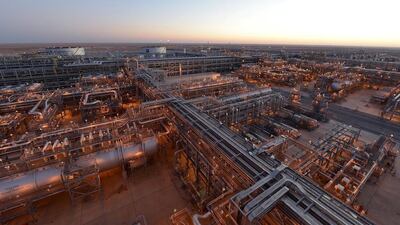Saudi Arabia, the world’s largest crude exporter, stands to reap as much as 80 billion riyals (Dh78.29bn) from non-oil revenues next year after the introduction of a value added tax, an expatriate worker tariff and the possible introduction of a levy on luxury goods, a report said.
“Non-oil revenues are somewhat lower year-on-year in the first half of 2017 but should increase materially starting from 2018 onwards as fiscal reforms kick in,” said Jean-Michel Saliba, an economist at Bank of America Merrill Lynch.
“First half non-oil revenues stood at about 45 per cent of the budget target. In the meantime, the excise tax on soft drinks, tobacco and energy drinks as well as the fee on dependents of expatriate workers could add in 7.5bn riyals of non-oil revenues in the second half of 2017.”
Saudi Arabia, the Arab world's biggest economy, has been following an economic diversification agenda that intends to lower dependence on hydrocarbons as primary revenue streams.
Under Vision2030 outlined by Crown Prince Mohammed bin Salman, the country has started to reduce energy subsidies and outline plans for new revenue streams that include various forms of taxation, developing its manufacturing sector and most notably the sale of stakes in government-owned companies such as the oil and gas firm Saudi Aramco. A 5 per cent listing of Aramco, expected to be the largest-ever globally may raise as much as US$100bn.
These measures and the pivot towards economic diversification are all the more pressing given a three-year oil slump that has reduced the price of oil by more than half to about US$50 per barrel. The kingdom's reserves, although still substantial, have continued to decline over the January-May 2017 period and stand now at $499bn – a decrease of $247bn since its August 2014 high, according to Indosuez Wealth Management, the global wealth management arm of France's Crédit Agricole.
___________________
Read more:
GCC corporate earnings to remain stable in 2017, report says
GCC currency pegs remain resilient, can withstand future pressures
___________________
Saudi Arabia has taken measures to shore up its finances with the government selling $17.5bn in bonds in its biggest international sale last year.
The state relies on sales of crude to fund more than 75 per cent of the budget, and the drop in oil prices created a shortfall last year that has been estimated at $100bn.
Mr Saliba noted, however, that Saudi Arabia's improved fiscal performance in the first half of 2017 was largely through tight spending and continued reliance on oil masking a weak external balance. "While political developments and seasonal increase in domestic energy consumption may have delayed the next leg of fiscal reforms, we still expect the latter to take place by year-end," he added.
“Tight spending is likely keeping non-oil real GDP growth weak. This may suggest a more back-loaded path for fiscal consolidation or the concurrent introduction of a private sector support package alongside fiscal reforms.”

